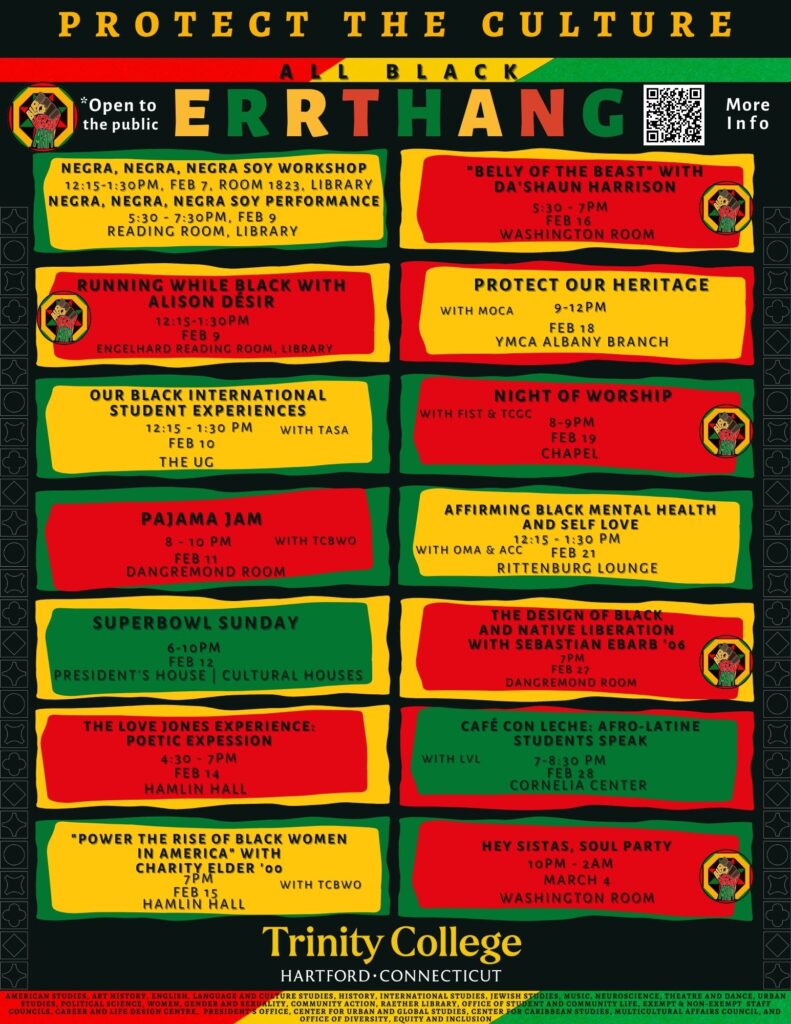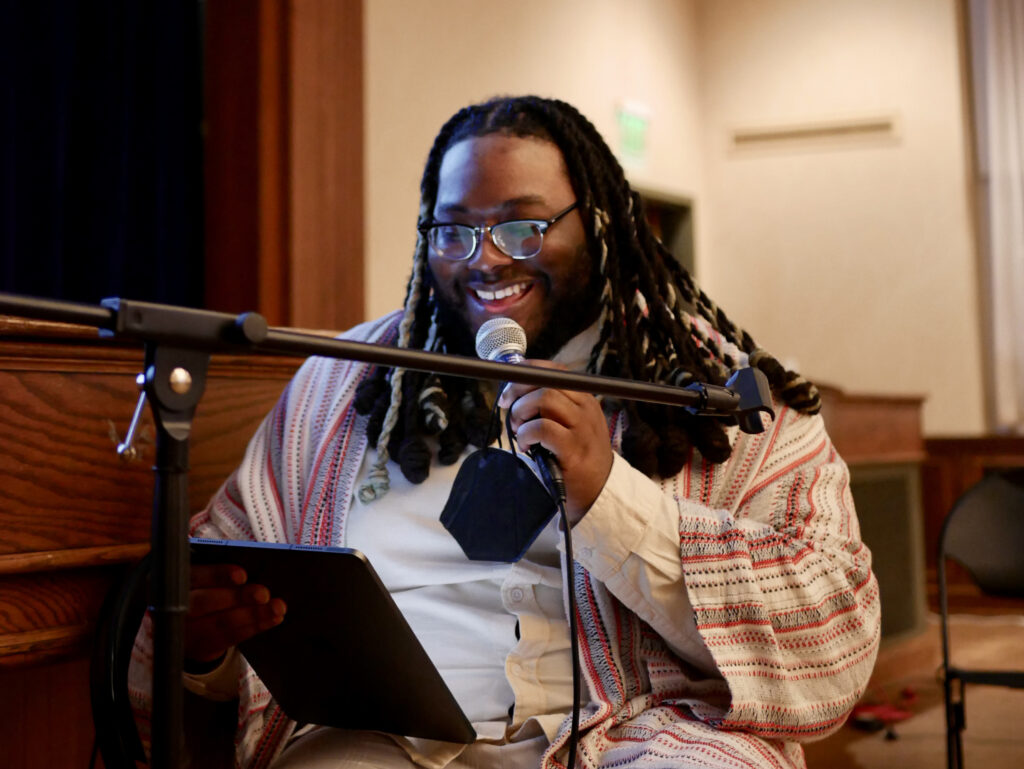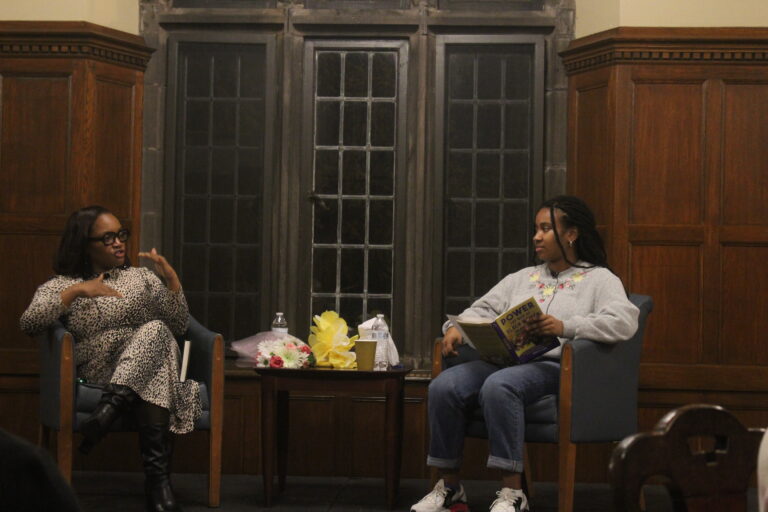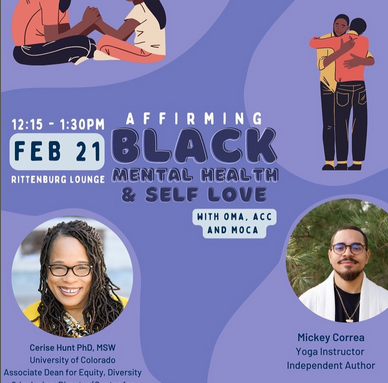Black History Month Events Engage Trinity Community in Discussions of Intersectionality
A full schedule of Black History Month events at Trinity College included a visit from keynote speaker Da’Shaun Harrison, a Black trans theorist and storyteller.
 “Protect the Culture: All Black Errthang” served as the theme for this year’s Black History Month programming, encompassing diverse aspects of Black history and culture for the Trinity community to explore.
“Protect the Culture: All Black Errthang” served as the theme for this year’s Black History Month programming, encompassing diverse aspects of Black history and culture for the Trinity community to explore.
Harrison led an engaging conversation with Trinity students at Mather Hall’s Washington Room to discuss their award-winning debut book, Belly of the Beast: The Politics of Anti-Fatness as Anti-Blackness. Harrison dedicated a portion of the February 16 event to reading an excerpt from one of their book’s chapters, “Policing and the Black Fat,” making connections to how Black people are targets of racial and fat discrimination in the “Black Lives Matter” movement and the Cook County criminal court system.
“There is no beast without the belly, and there is no belly without the beast. The Black fat experiences police brutality at disproportionate rates because their largeness coupled with their Blackness is spread as dangerous, destructive, and inherently violent,” Harrison said.
Historical colonization and oppression were key points that Harrison used to further contextualize the agency of Black people who faced double-sided prejudice from oppressive structures, including police brutality and the biased health parameters of the obesity pandemic. Harrison said, “None of them could exist in their current iteration without the Black fat’s resistance.”

After the audience Q&A with Harrison, Tenzin Sharlung ’24, a sociology and biochemistry major, said, “It was a conversation that would never otherwise happened. It’s really important to bring in someone like Da’Shaun, who has these real-life experiences, who has dedicated their life to this type of work, because it’s not the same as having a professor in a classroom setting talking about specific pieces they read by someone like Da’Shaun.”
Planning this event involved the collaborative efforts of the Black History Month Committee, consisting of student cultural organizations on campus and Trinity’s Office of Multicultural Affairs. Deion Kelly ’23, a sociology major and community action minor, served as one of the student co-leads and explained the process of how the committee chose this year’s keynote speaker. “We wanted a speaker to really encapsulate the theme of ‘Protect the Culture: All Black Errthang,’ but we also wanted a speaker who was just really very different from all the speakers that we’ve had previously,” Kelly said.
Renita Washington ’22, program assistant for the Office of Multicultural Affairs, served as staff support for the students in charge of planning events. Washington shared how Harrison provided an insightful experience about the Black community for students to learn.

“Their book is talking about anti-fatness, which is something that personally impacts me, but also how it equates to anti-Blackness, which also personally affects me because of media coverage and how everybody talks about obesity and the Black community,” Washington said. “It’s not something that people really think about when they’re talking about what fatness looks like as an American.”
Sydney Cross-Watts ’24, a political science major and legal studies minor and a co-lead on the Black History Month Committee, talked about the challenges and successes of this program. “We didn’t get the turnout that we necessarily wanted, but I think the people that wanted to be there and needed to be in that space were there, and you could really feel that presence during Da’Shaun’s presentation of their book as well as the discussion they led,” Cross-Watts said.
With community engagement as a priority, the committee collaborated with departments, offices, and organizations across campus to bring more awareness of Black History Month to Trinity.
Washington said, “We really worked hard in planning out two months in advance; it really helped us to figure out how to engage the whole campus community.”
 The support from student cultural organizations centered the event programming around what students themselves were most interested in, including returning favorites like the “Protect Our Heritage” event. Kelly said he developed this event as a first-year student with the Men of Color Alliance (MOCA) to provide student community service revolving around the significance of Black History Month.
The support from student cultural organizations centered the event programming around what students themselves were most interested in, including returning favorites like the “Protect Our Heritage” event. Kelly said he developed this event as a first-year student with the Men of Color Alliance (MOCA) to provide student community service revolving around the significance of Black History Month.
“It’s an event where we partner up with the local YMCA in Hartford’s North End to educate the youth about Black history because they’re taking it out of schools, so we’ve been doing this for three years,” Kelly said.
Another event that aimed to connect with students’ wellbeing was “Affirming Black Mental Health and Self Love,” which Cross-Watts said she enjoyed planning with her organization, Athletes of Color Coalition, alongside MOCA and the Office of Multicultural Affairs.
 “I think this was just a necessary event because oftentimes in the Black community, we don’t discuss mental health,” Cross-Watts said. “When we do discuss mental health, it’s just about the facts, it’s never about what we can do to help with mental health, such as loving ourselves, self-care, setting boundaries, and understanding that it’s okay to be racially fatigued when it comes to mental health, and there are different coping mechanisms for racial fatigue.”
“I think this was just a necessary event because oftentimes in the Black community, we don’t discuss mental health,” Cross-Watts said. “When we do discuss mental health, it’s just about the facts, it’s never about what we can do to help with mental health, such as loving ourselves, self-care, setting boundaries, and understanding that it’s okay to be racially fatigued when it comes to mental health, and there are different coping mechanisms for racial fatigue.”
The committee’s goals included not only increased attendance at its events since being back in person, but also stronger community bonding for students and faculty who are truly invested in studying and learning about Black History Month.
“The discussions that we’ve had and the engagement in those discussions, I think, have been really important, especially with coming out of COVID-19,” Cross-Watts said. “People aren’t as interactive when you have discussions, so now with everything in-person, we have speakers, we have people that are ready to discuss, so I think that was something that was really recognizable this Black History Month.”
The students on the committee hope that the success of Black History Month sparks interest in upcoming cultural events on campus. “It really encourages Trinity to engage more, especially in the background work by the students and staff, in order for these programs—whether for Black History Month, Women’s History Month, or AAPI Month—to really be a culminating experience not just for people of color, but for the entire campus community,” Kelly said.
